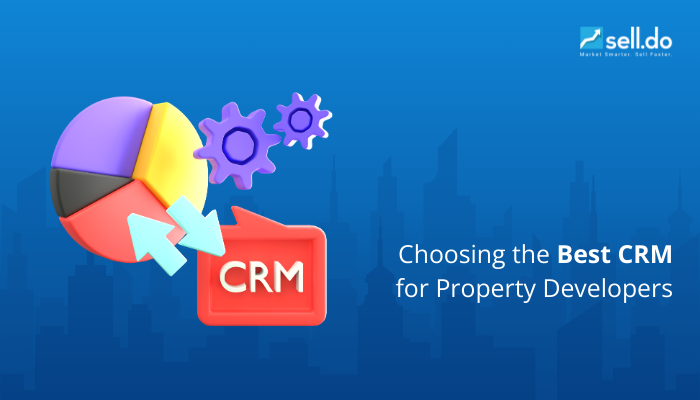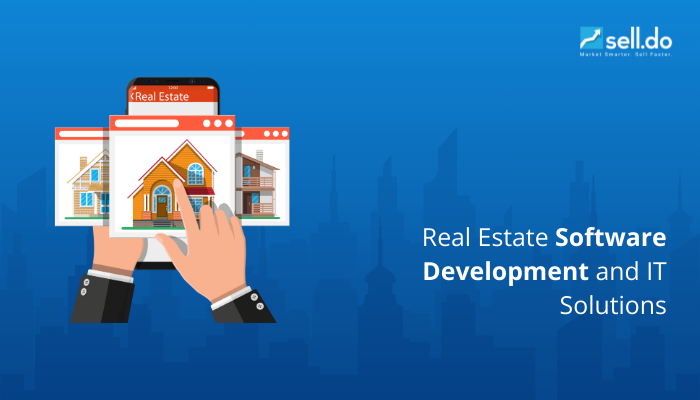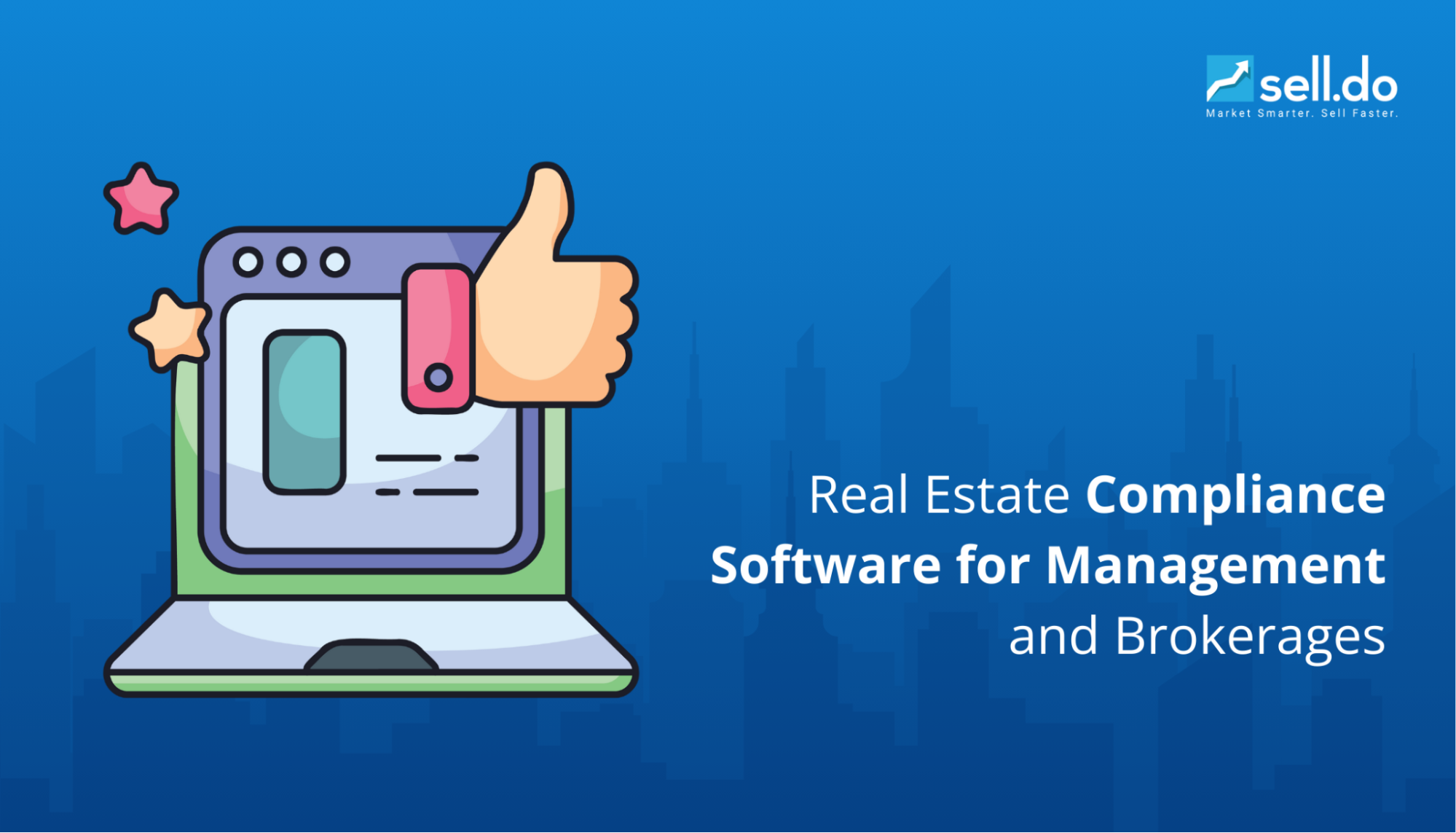Every missed follow-up or delayed response in real estate sales can mean losing a high-value deal. As a property developer, you’re not just selling homes—you’re managing large-scale projects, coordinating with multiple stakeholders, and ensuring a steady pipeline of buyers. A CRM for property developers helps you stay in control, but not all CRMs are built for this level of complexity.
The right system isn’t just about storing contacts; it should work as your sales engine, keeping everything organized and moving forward. But how do you choose one that truly fits your needs? Let’s look at what makes CRM effective for property developers.
Why Property Developers Need a CRM

A Customer Relationship Management (CRM) system is more than just a digital contact book. It’s a centralized platform that helps real estate businesses manage interactions, track leads, automate tasks, and streamline communication. For property developers, a CRM acts as a control center, bringing sales, project management, and customer relationships into one seamless system. Instead of juggling spreadsheets, emails, and phone calls, developers can oversee the entire sales journey—from lead generation to project handover—without missing a step.
Here’s why a CRM for property developers is essential:
- Managing Complex Sales Cycles: A CRM keeps track of leads at every stage, ensuring timely follow-ups and reducing the risk of losing potential buyers.
- Streamlining Lead Management and Project Tracking: From marketing campaigns to site visits, a CRM organizes and automates lead capture, assigning prospects to the right sales reps while providing real-time updates on project progress.
- Enhancing Customer Relationships: Buyers expect personalized attention. A CRM stores every interaction, making it easy to send updates, reminders, and responses, improving engagement and trust.
- Boosting Efficiency in Documentation and Compliance: Approvals, agreements, and compliance documents can slow down deals. A CRM centralizes paperwork, automates workflows, and helps you meet legal requirements without unnecessary delays.
To get the most out of a CRM, it’s important to have the right features tailored for property development. Here’s what to look for in a CRM built for property developers.
You can also check our blog: Conduct SWOT Analysis for Real Estate Agents and Businesses to assess every aspect of your business and leverage your strengths.
Key Features of CRM for Property Developers

Developers work with high-value transactions, multiple stakeholders, and long sales cycles, so the right CRM must cater to these unique needs. Here are the key features that make a real difference:
- Capture and Nurture Leads from Various Sources: Buyers come from different channels—websites, social media, property portals, and offline campaigns. A CRM automatically captures leads, assigns them to the right sales representatives, and nurtures them with timely follow-ups.
- Channel Partner Management: Developers rely on brokers and channel partners to drive sales. A CRM helps track their performance, manage commissions, and ensure smooth collaboration with real-time updates on leads and conversions.
- WhatsApp, IVR, GSM, Mobile App, and Chatbot Integration: Buyers expect quick responses. A CRM with multi-channel communication allows sales teams to engage leads via WhatsApp, automated calls (IVR), GSM-based follow-ups, and AI-powered chatbots. A mobile app ensures accessibility on the go.
- Productivity Management: Managing large-scale projects requires efficient coordination. A CRM provides task automation, performance tracking, and meeting reminders, ensuring sales teams and project managers stay on schedule.
- Document Management: Property sales involve extensive paperwork, from agreements to approvals. A CRM helps you store, organize, and streamline document sharing and signing, reducing manual work and speeding up deal closures.
- Data Security: Developers handle sensitive customer and financial data. A robust CRM includes encryption, role-based access, and compliance management to protect critical information and prevent unauthorized access.
With these features, a CRM for property developers becomes essential, improving efficiency, boosting sales, and enhancing customer relationships. Now, let’s take a look at the benefits of implementing a CRM.
Recommended: Top Proptech Examples and How They are Changing Real Estate
Benefits of Using a CRM for Property Developers
A CRM for property developers simplifies your workflow, making tracking leads, collaborating with channel partners, and closing deals easier. Here’s how it helps:
- Faster Lead Conversion: A CRM ensures every lead is captured, assigned, and nurtured, increasing the chances of closing deals.
- Better Coordination with Channel Partners: To drive more sales, monitor broker performance, manage commissions, and maintain transparency.
- Seamless Communication Across Channels: Integrate WhatsApp, calls, and chatbots to handle inquiries efficiently, ensuring quick responses to potential buyers.
- Simplified Document Handling: Store and retrieve agreements, approvals, and compliance documents in one place, reducing paperwork hassles.
- Improved Team Productivity: Automate routine tasks, set reminders, and track performance so teams stay focused on high-priority deals.
- Enhanced Data Security: Protect sensitive customer and financial data with secure access controls and encryption.
Seeing the benefits in action makes the impact of a CRM even clearer. Here are real examples of property developers who achieved success with the right CRM.
Also, check our blog: Property Management Software for Small Business Real Estate Maintenance in 2025
How Property Developers Benefit from CRM: Real Examples
Take a look at real-life examples of how property developers have used a CRM to streamline operations, boost sales, and improve customer relationships.
Mantra Properties
Mantra Properties faced several operational challenges that affected efficiency and customer experience. Lead source conflicts made tracking and attribution difficult, while manual processes for site visits, bookings, and launches led to delays. Inefficient site visit tracking resulted in missed appointments, and limited data visibility made it harder to optimize conversions.
To resolve these issues, Mantra Properties implemented Sell.Do’s CRM. OTP verification ensured lead authenticity, while automated site-visit scheduling streamlined the booking process. An auto source change restriction prevented manual errors in lead tracking, and digital KYC with e-signatures eliminated paperwork delays. Sell.Do also introduced site visit validation, improving data accuracy and transparency. You can check the case study here.
Results Achieved:
- 50% improvement in lead attribution accuracy.
- 84% faster KYC processing time.
- 89% increase in customer satisfaction rate.
- 63.6% improvement in site visit completion rates.
- 100% error-free documentation.
CasaGrand
Rising marketing costs and increasing competition made capturing and converting leads efficiently challenging for CasaGrand. With customers having more choices than ever, staying connected throughout the buying cycle became critical. To maintain engagement and drive conversions, CasaGrand needed a system that could streamline lead nurturing and prioritize high-intent buyers.
Sell.Do provided the perfect solution. CasaGrand’s team of 455 agents leveraged the CRM to make 150 calls daily, ensuring constant communication with prospects. A robust drip nurturing system—integrating emails, SMS, and WhatsApp—kept leads engaged. Sell.Do’s lead scoring system tracked interactions and automatically assigned scores, helping agents focus on the most promising prospects. This data-driven approach enabled CasaGrand to re-engage leads effectively, securing 50% of their sales from nurtured prospects. Click here to go through the case study.
Results Achieved:
- 400 bookings in a single month.
- 70,000 interactions were managed monthly.
- 50% of bookings were generated from CRM data.
- 50% increase in marketing and sales efficiency.
Mahindra Happinest
When the COVID-19 pandemic made homebuyers hesitant to visit sites in person, Mahindra Lifespaces saw the need for a fully digital home-buying experience. Safety concerns prevented families from making collective decisions, and many buyers found online platforms complex. Additionally, traditional sales methods struggled to engage digital-native buyers like millennials and NRIs. Managing channel partners remotely and tracking their performance in real time also posed challenges.
To overcome these hurdles, Mahindra Happinest partnered with Sell.Do to launch Happinest Palghar as India’s first fully digital real estate sales model. Targeted lead nurturing campaigns engaged buyers online, while virtual walkthroughs and video conferencing replaced in-person interactions. Buyers could explore projects, select apartments, view pricing, and complete bookings with online KYC, e-documentation, and e-payments—all without a single site visit. Sell.Do also streamlined channel partner collaboration, making inventory tagging and commission management seamless. You can check the complete case study here.
Results Achieved:
- 10,000+ leads managed effectively.
- 250+ virtual meetings conducted daily.
- 300+ bookings completed in just three weeks.
- 0 physical site visits
With so many CRM options available, selecting the right one is crucial. Here’s what property developers should consider when choosing a CRM.
Optimize your digital marketing campaigns with our Tips for Writing Catchy Taglines for Real Estate Developers!
How to Choose the Right CRM for Property Developers
The right CRM should simplify operations, enhance sales, and support business growth. A one-size-fits-all solution won’t work—property developers need a system designed for real estate. Here’s what to consider when making your choice:
- Scalability and Customization: Ensure the CRM can grow with your business and adapt to different project sizes and workflows.
- Real Estate-Specific Features: Generic CRMs lack tools like site-visit tracking, inventory management, and channel partner collaboration. Choose a platform built for real estate.
- Integration Capabilities: A good CRM should seamlessly connect with marketing automation, finance systems, and ERP tools to streamline operations.
- Onboarding and Support: Look for a provider offering proper training, implementation assistance, and ongoing customer support to help your team maximize the system.
Understanding what to look for in a CRM is just the first step. Here are some of the top CRM solutions designed specifically for property developers.
If you need to drive more leads to your business, check our blog: Top Real Estate Social Network Platforms and Their Strategies.
Leading CRM Solutions for Property Developers
The right CRM can help property developers manage leads, streamline sales, and improve customer interactions. While many options exist, some CRMs offer features tailored specifically for real estate businesses. Here are a few top choices worth considering.
Sell.do

Sell.Do is the leading real estate CRM designed to help developers manage sales, marketing, and customer relationships effortlessly. Trusted by 1,000+ developers across 26 cities and three countries, it streamlines operations with AI-driven insights, automation, and seamless integrations. Backed by Aurum PropTech, Sell.Do has been rated as the most implementable CRM Platform of the year 2024 and is the highest-rated real estate CRM on G2 for ease of use.
Key Features Built for Property Developers
- 100% Lead Capture & Source Tracking: Automatically collect and tag leads from websites, digital campaigns, property portals, and channel partners.
- Integrated Communication Suite: Engage customers through WhatsApp, SMS, email, IVR, and mobile apps for higher conversion rates.
- Inventory & Pricing Automation: Prevent double bookings, manage dynamic pricing, and streamline negotiations with an approval engine.
- Channel Partner Management: Automate partner onboarding, commission payouts, and real-time collaboration to improve broker efficiency.
- Paperless Documentation & Payments: Enable e-KYC and digital agreements and secure online transactions for a seamless buying experience.
- AI-Powered Insights & Analytics: Track demand, optimize marketing spend, and improve sales efficiency with real-time reporting.
Sell.Do transforms how developers sell, ensuring faster conversions, higher revenue, and a frictionless homebuying experience.
Why Choose Sell.Do?
- 20% Faster Bookings – Speed up sales cycles with AI-powered demand prediction, transparent inventory management, and seamless digital transactions.
- 15% Higher Revenue Per Sq. Ft. – Optimize pricing and maximize returns using AI-driven pricing strategies.
- 10% Lower Drop-Off Rates – Reduce buyer hesitation with a smooth, paperless booking process and real-time project insights.
- 18% Faster Cash Flow – Accelerate revenue realization through automated bookings and payment processing.
4QT
4QT specializes in real estate process automation, offering tailored solutions for lead tracking, inventory management, and post-sales operations. Its intuitive interface and in-depth analytics help developers make data-driven decisions. The CRM also integrates with marketing tools, allowing seamless campaign execution and performance tracking.
Paramantra CRM
Designed with a strong focus on customer engagement, Paramantra CRM provides omnichannel communication, ensuring seamless interactions across calls, emails, and messaging apps. Its advanced automation features minimize manual work, and AI-driven insights help developers understand customer preferences and buying behavior.
Salesforce CRM
One of the most powerful and scalable CRMs, Salesforce offers extensive customization for real estate businesses. Developers can leverage its AI-powered analytics, workflow automation, and third-party integrations for end-to-end sales and customer relationship management. While highly capable, it often requires expert setup and configuration.
In4Velocity
In4Velocity is an ERP-integrated CRM designed specifically for real estate businesses. It combines sales, projects, and financial management into one platform, offering a complete view of business performance. With built-in modules for land acquisition, construction tracking, and payment scheduling, it caters to large-scale developers.
Tranquil CRM
Tranquil CRM offers a user-friendly platform with a strong focus on document management and compliance tracking. Developers benefit from automated contract generation, payment collection reminders, and customer service tools that ensure smooth post-sales engagement. Its cloud-based architecture makes it highly scalable.
Also, read our blog: Latest Proptech Market Insights and Trends.
Conclusion
A well-designed CRM isn’t just about organizing data—it transforms the way property developers handle sales, customer interactions, and project management. With the right system in place, you can eliminate manual inefficiencies, ensure timely follow-ups, and provide a seamless buying experience. Beyond just boosting sales, CRM helps maintain strong relationships with customers and channel partners, leading to higher satisfaction and long-term growth.
Choosing a real estate-specific CRM like Sell.Do ensures that every aspect of your sales and marketing process is optimized for success. Investing in the right technology today can set the foundation for a more efficient and profitable future.
Ready to take your real estate business to the next level? Get Sell.Do, the best CRM for property developers and experience the difference.






Leave a comment
Comments (0)
Be the first one to comment.